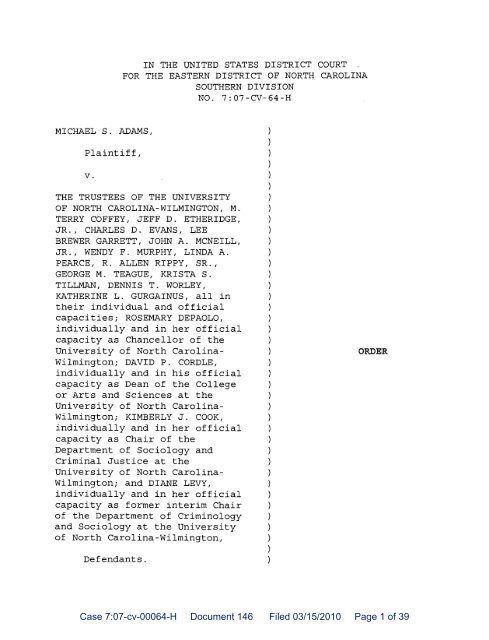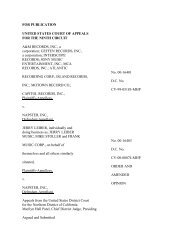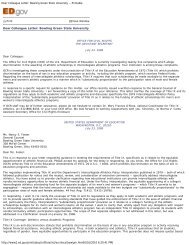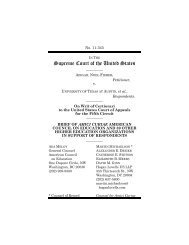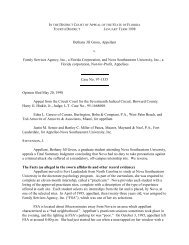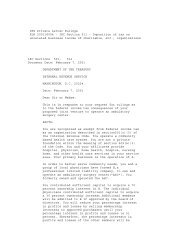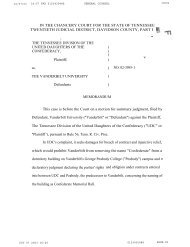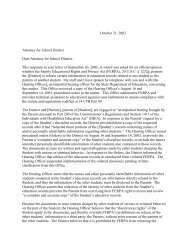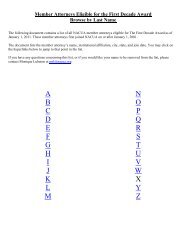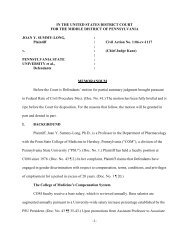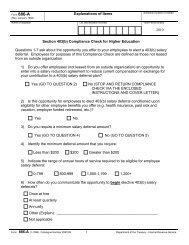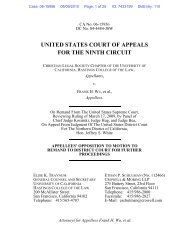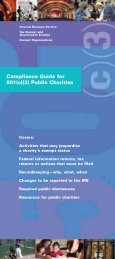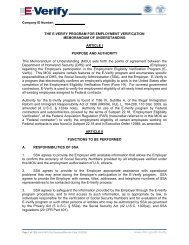Adams v. Trustees UNC Wilmington, et al. - National Association of ...
Adams v. Trustees UNC Wilmington, et al. - National Association of ...
Adams v. Trustees UNC Wilmington, et al. - National Association of ...
Create successful ePaper yourself
Turn your PDF publications into a flip-book with our unique Google optimized e-Paper software.
IN THE UNITED STATES DISTRICT COURTFOR THE EASTERN DISTRICT OF NORTH CAROLINASOUTHERN DIVISIONNO. 7:07-CV-64-HMICHAEL S. ADAMS, ))Plaintiff, ))v. ))THE TRUSTEES OF THE UNIVERSITY )OF NORTH CAROLINA-WILMINGTON, M. )TERRY COFFEY, JEFF D. ETHERIDGE, )JR., CHARLES D. EVANS, LEE )BREWER GARRETT, JOHN A. MCNEILL, )JR., WENDY F. MURPHY, LINDA A. )PEARCE, R. ALLEN RIPPY, SR., )GEORGE M. TEAGUE, KRISTA S. )TILLMAN, DENNIS T. WORLEY, )KATHERINE L. GURGAINUS, <strong>al</strong>l in )their individu<strong>al</strong> and <strong>of</strong>fici<strong>al</strong> )capacities; ROSEMARY DEPAOLO, )individu<strong>al</strong>ly and in her <strong>of</strong>fici<strong>al</strong> )capacity as Chancellor <strong>of</strong> the )University <strong>of</strong> North Carolina )<strong>Wilmington</strong>; DAVID P. CORDLE, )individu<strong>al</strong>ly and in his <strong>of</strong>fici<strong>al</strong> )capacity as Dean <strong>of</strong> the College )or Arts and Sciences at the )University <strong>of</strong> North Carolina )<strong>Wilmington</strong>; KIMBERLY J. COOK, )individu<strong>al</strong>ly and in her <strong>of</strong>fici<strong>al</strong> )capacity as Chair <strong>of</strong> the )Department <strong>of</strong> Sociology and )Crimin<strong>al</strong> Justice at the )University <strong>of</strong> North Carolina )<strong>Wilmington</strong>; and DIANE LEVY, )individu<strong>al</strong>ly and in her <strong>of</strong>fici<strong>al</strong> )capacity as former interim Chair )<strong>of</strong> the Department <strong>of</strong> Criminology )and Sociology at the University )<strong>of</strong> North Carolina-<strong>Wilmington</strong>, ))Defendants. )ORDERCase 7:07-cv-00064-H Document 146 Filed 03/15/2010 Page 1 <strong>of</strong> 39
This matter is before the court on defendants' motion forsummary judgment.Plaintiff has responded, and defendants havereplied.The motion is ripe for adjudication.STATEMENT OF THE CASEPlaintiff Michael S. <strong>Adams</strong>, a tenured associate pr<strong>of</strong>essorat the University <strong>of</strong> North Carolina-<strong>Wilmington</strong> (<strong>UNC</strong>W) ,broughtthis action against sixteen defendants: <strong>UNC</strong>W's Chancellor,Rosemary DePaolo; twelve members <strong>of</strong> <strong>UNC</strong>W's Board <strong>of</strong> <strong>Trustees</strong>;Dr. David Cordle, Dean <strong>of</strong> the College <strong>of</strong> Arts and Sciences; Dr.Diane Levy, the former interim Chair <strong>of</strong> the Department <strong>of</strong>Sociology and Crimin<strong>al</strong> Justice (the "Department"); and theDepartment's current chair, Dr. Kimberly Cook. Plaintiff<strong>al</strong>leges that defendants r<strong>et</strong><strong>al</strong>iated against him for his Christianand politic<strong>al</strong>ly conservative speech by denying his applicationfor promotion to full pr<strong>of</strong>essor and by subjecting him tointrusive investigations.Plaintiff seeks declaratory reliefand mon<strong>et</strong>ary damages, <strong>al</strong>leging (1) religious discrimination, inviolation <strong>of</strong> Title VII <strong>of</strong> the Civil Rights Act <strong>of</strong> 1964,asamended, 42 U.S.C. ss 2000e to 2000e-17 (2000) ("Title VII");(2) viewpoint discrimination and r<strong>et</strong><strong>al</strong>iation for protectedexpression, in violation <strong>of</strong> 42 U.S.C. § 1983 and the FirstAmendment; and, (3) deni<strong>al</strong> <strong>of</strong> equ<strong>al</strong> protection <strong>of</strong> the laws, inviolation <strong>of</strong> § 1983 and the Fourteenth Amendment. The courtpreviously dismissed plaintiff's claims for mon<strong>et</strong>ary damages2Case 7:07-cv-00064-H Document 146 Filed 03/15/2010 Page 2 <strong>of</strong> 39
against defendants in their <strong>of</strong>fici<strong>al</strong> capacities and plaintiff'sTitle VII claims against defendants in their individu<strong>al</strong>capacities.STATEMENT OF THE FACTSThecourt herein recites the facts in the light mostfavorable to plaintiff, the nonmoving party.I. Events Preceding Plaintiff's Application for PromotionIn 1993, plaintiff was hired as an assistant pr<strong>of</strong>essor <strong>of</strong>criminology at <strong>UNC</strong>W.At that time, plaintiff was an atheistwith liber<strong>al</strong> politic<strong>al</strong> beliefs.Plaintiff earned numerousawards and accolades in his initi<strong>al</strong> years <strong>of</strong> teaching.Heearned strong teaching ev<strong>al</strong>uations, amassed an impressivecollection <strong>of</strong> publications, received outstanding peer reviews,and established an exemplary record <strong>of</strong> service to theDepartment, <strong>UNC</strong>W, and the community. He earned two FacultyMember <strong>of</strong> the Year awards. And in 1998, he was promoted toassociate pr<strong>of</strong>essor, a tenured position.In 2000, plaintiff became a Christian and a politic<strong>al</strong>conservative.After this, plaintiff continued to earn praisefrom the department chair as one <strong>of</strong> the university's bestinstructors, and for his scholarship and service.In early 2001,plaintiff sent emails to his colleaguesvoicing concern about the questioning <strong>of</strong> candidates foremployment regarding their politic<strong>al</strong> preferences, and faculty3Case 7:07-cv-00064-H Document 146 Filed 03/15/2010 Page 3 <strong>of</strong> 39
membersprocess.airing anti-religious sentiments during the interviewPlaintiff engaged in an email exchange with anotherfaculty member, Dr. Lynne Snowden ("Snowden") (not a defendanthere) , about the propri<strong>et</strong>y <strong>of</strong> basing hiring decisions onpolitic<strong>al</strong> orientation. (PI.'s Resp. Ex. 1, pp. 1-3.)On September 15, 2001, a <strong>UNC</strong>Wstudent sent an email to anumber <strong>of</strong> students and faculty members,including plaintiff,blaming the September 11 attacks on U.S. foreign policy.Plaintiff responded two days later, c<strong>al</strong>ling the student's email"bigoted, unintelligent, and immature," but noting that theConstitution protected her writing, just as it protected hisresponse. (Compl. Ex. 17.) On September 20, the student fileda complaint with <strong>UNC</strong>W<strong>al</strong>leging that plaintiff's email message,using university computing facilities and services, intended tointimidate and defame her, and in doing so violated the Code <strong>of</strong>Student Life and <strong>UNC</strong>W personnel policies. She demanded aninvestigation and specific<strong>al</strong>ly asked that the university <strong>al</strong>lowher to view email messages sent by plaintiff to others, toascertain what, if any, exchanges plaintiff had engaged inregarding the student's emails. 1IThe complaint filed by the student with the university <strong>al</strong>sohighlighted three email messages from other senders thattroubled her, two <strong>of</strong> which made her fear for her person<strong>al</strong> saf<strong>et</strong>yand <strong>al</strong>l <strong>of</strong> which, she asserted, constituted defamation,intimidation, and/or the communication <strong>of</strong> threats.4Case 7:07-cv-00064-H Document 146 Filed 03/15/2010 Page 4 <strong>of</strong> 39
The university undertook considerable efforts to preventanyone inside or outside the administration from viewingplaintiff's emails--efforts plaintiff acknowledged when heappeared on the television program Hannity &Colmes to discussthe incident. (Compl. Exs. 21-30.)2 In fact, <strong>UNC</strong>W rejected thestudent's initi<strong>al</strong> request to access plaintiff's emails, statingthe university's position that the emails were person<strong>al</strong> and thusnot subject to the student's public records request.When thestudent objected, <strong>of</strong>fering a contrary view <strong>of</strong> the pertinentstate law,the university reaffirmed its position and informedthe student that it would not force the faculty membertoproduce the requested emails for inspection. (Compl. Ex. 25.)The student again <strong>of</strong>fered objections grounded in her an<strong>al</strong>ysis <strong>of</strong>the state public records law, and the university again defendedplaintiff, this time telling the student, "The decision <strong>of</strong> theUniversity is fin<strong>al</strong>." (Id. ) Only when the student responded afourth time, threatening leg<strong>al</strong> action, did the universityparti<strong>al</strong>ly relent, with the university counsel requesting thatthe information technology department attempt to r<strong>et</strong>rieve andexamine messages sent by plaintiff on the dates in question.And even then, the university did not turn any <strong>of</strong> the subj ect2The university's efforts and plaintiff's publicacknowledgement <strong>of</strong> them make it extremely surprising that theplaintiff herein refers to the university's subsequent actions,d<strong>et</strong>ailed here, as an "intrusive investigation" into his emails(Pl.'s Resp. Br. at 3).5Case 7:07-cv-00064-H Document 146 Filed 03/15/2010 Page 5 <strong>of</strong> 39
emails over to the student, deeming them private correspondenceand not public records. (Comp1. Ex. 27 . )In November 2001, Snowden (again, not a defendant here)accused plaintiff and the department chair, Dr.Cecil Willis("Willis") , <strong>of</strong> "workplace terrorism" and a "hate crime, "claiming they had sprayed an "unknown gas" or "pepper spray" inher <strong>of</strong>fice. Both men were cleared <strong>of</strong> wrongdoing. (Compl. Ex.41-43.)In May 2002, plaintiff published a column criticizing <strong>UNC</strong>Wand the department for <strong>al</strong>leged religious intolerance.Later thesame month, plaintiff received a positive ev<strong>al</strong>uation for theprior year from Willis, the department chair.In September2003, plaintiff began writing a column for the websiteTownh<strong>al</strong>l.com. His column focused on the cultur<strong>al</strong> andideologic<strong>al</strong> climate on university campuses, including issues <strong>of</strong>academic freedom,constitution<strong>al</strong> abuses, discrimination, race,gender, homosexu<strong>al</strong> conduct, feminism, Islamic extremism, andmor<strong>al</strong>ity.It <strong>al</strong>so showcased plaintiff's conservative religiousbeliefs. Soon after plaintiff started writing the column,university administrators and faculty members were inundatedwith a flood <strong>of</strong> complaints from ups<strong>et</strong> readers, includingpotenti<strong>al</strong> donors.In email exchanges with one another, faculty,administrators, and trustees pointed to the column's lack <strong>of</strong>intellectu<strong>al</strong> rigor, likened it to t<strong>al</strong>k show rh<strong>et</strong>oric, and voiced6Case 7:07-cv-00064-H Document 146 Filed 03/15/2010 Page 6 <strong>of</strong> 39
their hope that the column and the controversy would qui<strong>et</strong>ly goaway. (Plo's Resp. Ex. 3.) In spite <strong>of</strong> the controversy, in2003, plaintiff received a positive ev<strong>al</strong>uation for the prioryear.In April 2004, Willis asked plaintiff not to discuss hisonline column at work because it ups<strong>et</strong> the department'ssecr<strong>et</strong>ary.3Though plaintiff complied, the secr<strong>et</strong>ary continuedto read his columns and eventu<strong>al</strong>ly complained about them to theuniversity counsel.Also in the spring <strong>of</strong> 2004, faculty membersdescribed plaintiff to the loc<strong>al</strong> paper as "a wannabe right wingpundit," "ment<strong>al</strong>ly unb<strong>al</strong>anced," and a "pathologic<strong>al</strong> liar."(Pl.'s Resp. Exs. 5-6.)In the summer <strong>of</strong> 2004, Levy became the interim chair <strong>of</strong> thedepartment.That f<strong>al</strong>l, she m<strong>et</strong> with plaintiff and voiced herconcern that his writings contained mean-spirited person<strong>al</strong>attacks directed toward the department secr<strong>et</strong>ary, claiming thatthey were hurting department collegi<strong>al</strong>ity.Plaintiff defendedhis right to write what he wanted, explaining that he wasreacting to the secr<strong>et</strong>ary's having criticized his views in front<strong>of</strong> students.Plaintiff indicated his desire to emulate AnnCoulter's writing style, while Levy encouraged him to write in amore scholarly manner, like William F. Buckley.Levy suggested3Plaintiff has not identified evidence that any nameddefendant knew <strong>of</strong> or encouraged Willis's request.7Case 7:07-cv-00064-H Document 146 Filed 03/15/2010 Page 7 <strong>of</strong> 39
that she me<strong>et</strong> with plaintiff and the secr<strong>et</strong>ary to mediate thedispute, but plaintiff declined.(<strong>Adams</strong> Dep. 42-44, 57-58; LevyDep. 76-81; Levy Decl. ~~ 9-11.) Levy never demanded thatplaintiff change his writing style or stop writing his column.In the spring <strong>of</strong> 2005, the UNew Faculty Senate continued <strong>al</strong>ong-running debate over wh<strong>et</strong>her to add "collegi<strong>al</strong>ity" as an<strong>of</strong>fici<strong>al</strong> criterion for Reappointment, Promotion, and Tenure.Their consideration <strong>of</strong> the issue in 2005 was prompted in part bydefendant DePaolo, who supported the proposed addition as aresult <strong>of</strong> the controversy over plaintiff and his writings.TheFaculty Senate ultimately rejected the propos<strong>al</strong>.(Pl. 's Resp.Ex. 7.)Levy compl<strong>et</strong>ed plaintiff's 2004 ev<strong>al</strong>uation in the summer <strong>of</strong>2005. The ev<strong>al</strong>uation cat<strong>al</strong>ogued plaintiff's work in fourspecific areas, teaching, advising, research, and service.Teaching: Plaintiff taught three courses in the spring2004 and three in the f<strong>al</strong>l 2004, teaching about 170students over<strong>al</strong>l. His courses were "well-prepared andup-to-date." Students rated him "above average toexcellent." Peer reviewers rated plaintiff's teachingas "good" (average in the department). Each semester,at least one student recognized plaintiff for makingan outstanding contribution to his or herundergraduate career. 4Advising: Plaintiff advised approximately 25-30students each semester in 2004.4Pl a i n t i f f claims, and the court accepts as true, that Levyfailed to include in this ev<strong>al</strong>uation a teaching award plaintiffearned in 2004.8Case 7:07-cv-00064-H Document 146 Filed 03/15/2010 Page 8 <strong>of</strong> 39
Research: Plaintiff had one article published in 2004in an excellent peer-reviewed journ<strong>al</strong>. He had oneother article submitted for publication. Hiscolleagues ranked this as "good," which was aboutaverage in the department.Service: Plaintiff's service was "noted mostly by hisabsence." He "participated little in departmentbusiness and me<strong>et</strong>ings" and "neglected to fulfill hisassigned obligation as a classroom observer for ajunior faculty member." Plaintiff served as a facultyadvisor to student organizations and as a contributorand commentator on politic<strong>al</strong> issues in the communityand nation.(Comp I . Ex . 4 0 . ) In the "Summary and Go<strong>al</strong>s" section <strong>of</strong>plaintiff's ev<strong>al</strong>uation, Levy wrote that plaintiff "appear [ed] tohave slowed his productivity as his efforts are directedelsewhere."She encouraged plaintiff to participate morein department affairs and, noting his likely pursuit <strong>of</strong> apromotion,suggested that to be successful, "he will need toincrease his productivity in scholarship and publication inpeer-reviewed academic outl<strong>et</strong>s." (Id. ) .Defendant Cook became department chair in August 2005.During the 2005-2006 school year and into the summer <strong>of</strong> 2006,plaintiff's columns generated controversy and drew the attention<strong>of</strong> defendants DePaolo, Cordle, and Cook. (See PI.'s Resp. Ex. 3at 66.)For instance, plaintiff chose in one column to respondto a l<strong>et</strong>ter he received from the Vice President <strong>of</strong> the Nation<strong>al</strong>Organization for Women's Orlando, Florida chapter.Among otherthings, plaintiff's column suggested members<strong>of</strong> the writer's9Case 7:07-cv-00064-H Document 146 Filed 03/15/2010 Page 9 <strong>of</strong> 39
organization were too preoccupied wi th "masturbation andparti<strong>al</strong>-birth abortion advocacy" to read books or news articlesin their entir<strong>et</strong>y i "d<strong>et</strong>ached from re<strong>al</strong>ity" i "stupid enough tothink they can achieve politic<strong>al</strong> equ<strong>al</strong>ity by killing their <strong>of</strong>fsprings"i "irration<strong>al</strong> [and] hopelessly caught up in the past" iand should change their name from NOW to "Tot<strong>al</strong>ly Hysteric<strong>al</strong>Emotion<strong>al</strong> Nabobs" (THEN). (Snowden Dep. Ex. 8.) An individu<strong>al</strong>from outside the university brought this to the attention <strong>of</strong><strong>UNC</strong>W faculty and administrators.In debating how (if at <strong>al</strong>l) torespond, Snowden suggested the university might "interpr<strong>et</strong> the .article as sabotage," given its graphic content andplaintiff's inclusion <strong>of</strong> his place <strong>of</strong> employment and jobdescription at the conclusion <strong>of</strong> the article. (Id. )In the second incident highlighted by plaintiff in hisresponse brief, agroup c<strong>al</strong>led the "Gender Mutiny Collective"wrote to defendants DePaolo, Cordle, and Cook, among others,about plaintiff's "transphobic essays," concerned that plaintiffwould "pass on his transphobic attitude to his law enforcementstudents, thus perp<strong>et</strong>uating transphobia and transphobicviolence." (Cook Dep . Ex . V.) Defendant DePaolo wrote todefendants Cordle and Cook and another individu<strong>al</strong> (Paul Hosier),stating, "Please respond to me concerning the charge <strong>of</strong> passing10Case 7:07-cv-00064-H Document 146 Filed 03/15/2010 Page 10 <strong>of</strong> 39
on transphobic views to students." (Id. ) 5 Cordle and Cookresponded, with Cook noting no student complaints regarding theissue and supporting the notion that plaintiff's discussion <strong>of</strong>transgender issues in his class, if it occurred, would f<strong>al</strong>lwithin the ambit <strong>of</strong> academic freedom. (DePaolo Dep. Exs. 6-7.)II.Plaintiff's Application for Promotion to Full Pr<strong>of</strong>essorAt the end <strong>of</strong> July 2006,plaintiff form<strong>al</strong>ly applied forpromotion to full pr<strong>of</strong>essor. The <strong>UNC</strong>W Faculty Handbook s<strong>et</strong>forth "guidelines" for "interpr<strong>et</strong>ing and applying" the criteriafor promotion.These guidelines princip<strong>al</strong>ly explained thatthe cumulative performance record <strong>of</strong> the facultymember under consideration is ev<strong>al</strong>uated in four areas:teaching, research or artistic achievement, service,and scholarship and pr<strong>of</strong>ession<strong>al</strong> development. Thefaculty member's cumulative performance record shoulddemonstrate evidence <strong>of</strong> steady growth and maturation.[E] xcellence in teaching and in artistic achievementor research accomplishments rank highest among thecriteria for tenure and promotion decisions. Topreserve the strength and diversity <strong>of</strong> disciplines inthe College <strong>of</strong> Arts and Sciences, the criteriawill be reviewed with sufficient flexibility to permitrecognition <strong>of</strong> department<strong>al</strong> needs and individu<strong>al</strong>faculty contributions.[M]e<strong>et</strong>ing any quantifiable measures provideddoes not guarantee the award <strong>of</strong> tenure or promotion.It is the responsibility <strong>of</strong> the faculty member beingreviewed to provide persuasive documentation thatqu<strong>al</strong>itative criteria as well as any quantifiableaccomplishments have been m<strong>et</strong>. In addition, the5Plaintiff characterizes this one-sentence email asdefendant DePaolo "order[ing]" defendants Cordle and Cook to"investigate" wh<strong>et</strong>her plaintiff was passing on transphobic viewsto students. (Pl.'s Resp. Br. at 6.)11Case 7:07-cv-00064-H Document 146 Filed 03/15/2010 Page 11 <strong>of</strong> 39
department, college, and university consider theindividu<strong>al</strong>'s potenti<strong>al</strong> for future contributions tocontinuing and projected department<strong>al</strong> programs and toinstitution<strong>al</strong> plans.(Faculty Handbook, Cook Decl. Ex. 9.) Concerning the twohighest-ranking criteria, excellence in teaching and in artisticachievement or research accomplishments,the Faculty Handbookcontained specific language regarding the requirements forpromotion to full pr<strong>of</strong>essor.Teaching: Teaching excellence is expected forpromotion to the rank <strong>of</strong> pr<strong>of</strong>essor. It is expectedthat such excellence will be reflected in teachingperformance and content and in teaching activitiesoutside the classroom. Teaching excellence can <strong>al</strong>sobe demonstrated by the sharing <strong>of</strong> teaching skillsthrough such activities as the mentoring <strong>of</strong> juniorfaculty, attendance and presentations at teachingworkshops, and papers on teaching models andtechniques.Research accomplishments and artistic achievement:For promotion to the rank <strong>of</strong> full pr<strong>of</strong>essor, a facultymember is expected to demonstrate a tangible record <strong>of</strong>pr<strong>of</strong>ession<strong>al</strong>ly-reviewed substanti<strong>al</strong> contributions toone's discipline. Although a candidate for the rank<strong>of</strong> pr<strong>of</strong>essor is usu<strong>al</strong>ly expected to present mor<strong>et</strong>angible evidence <strong>of</strong> accomplishment than that <strong>of</strong> theassociate pr<strong>of</strong>essor rank, the difference in artisticand research expectations for a full pr<strong>of</strong>essor is notsolely quantitative. Greater qu<strong>al</strong>ity, maturity,significance and origin<strong>al</strong>ity <strong>of</strong> artistic achievementor research accomplishment are expected at this rank.(Id. ) The "service" promotion criterion was similar at <strong>al</strong>llevels <strong>of</strong> promotion, and was defined as "form<strong>al</strong> and inform<strong>al</strong>pr<strong>of</strong>ession<strong>al</strong> activities on beh<strong>al</strong>f <strong>of</strong> the faculty member'sdepartment, college, university, pr<strong>of</strong>ession, and the community12Case 7:07-cv-00064-H Document 146 Filed 03/15/2010 Page 12 <strong>of</strong> 39
at large." (Id. ) For promotion to full pr<strong>of</strong>essor, theuniversity required evidence <strong>of</strong> growth and leadership in theseareas.Fin<strong>al</strong>ly, for "scholarship and pr<strong>of</strong>ession<strong>al</strong> development,"the university looked for "activities that maintain and enhancea faculty member's pr<strong>of</strong>ession<strong>al</strong> comp<strong>et</strong>ence [, ] reflectedprimarily in growth and improvement in teaching, researchaccomplishments and artistic achievement, and servicecontributions." (Id. ) Elsewhere it is made plain that thesefour criteria in practice collapse to three: teaching, research,and service, with the requirements for "scholarship andpr<strong>of</strong>ession<strong>al</strong> development" diffused through these three.As department chair, defendant Cook at one point advised anew faculty member that the research criterion <strong>of</strong> the"tenure/promotion standard" had no specific numeric requirement.However, she explained that to remain on "Graduate Facultystatus" required a"lower limit" <strong>of</strong> one peer-reviewed journ<strong>al</strong>article every two years, with a"higher expectation" <strong>of</strong> onepeer-reviewed journ<strong>al</strong> article per year. (Cordle Dep. Ex. A' rCook Dep. 19-22.)6She stressed that qu<strong>al</strong>ity mattered, not just6Plaintiff erroneously refers to Cook's statements aspertaining to the standard for promotion to full pr<strong>of</strong>essor.(Pl. 's Resp. Br. at 7.) There is no indication in the recordthat Cook was referring here to anything beyond the requirementsfor maintaining "Graduate Faculty status." Moreover, as thisadvice was given to a new faculty member on the path to tenure,it is unclear wh<strong>et</strong>her Cook's statements, even if they applied tothis subcategory <strong>of</strong> promotion decision, would apply to the13Case 7:07-cv-00064-H Document 146 Filed 03/15/2010 Page 13 <strong>of</strong> 39
quantity, and that the param<strong>et</strong>ers she had s<strong>et</strong> out were "strictlyadvisory and not a guarantee" <strong>of</strong> a particular outcome. (Id. )In her deposition,former interim department chair Levyexplained that there was "no magic number" <strong>of</strong> publications forpromotion to full pr<strong>of</strong>essor, and that the focus was on what thepr<strong>of</strong>essor had done since the last promotion. (Levy Dep. 112( " [T] he tot<strong>al</strong> number would be less important than the numbersince the last promotion.").) Pressed to specify a range, Levy<strong>al</strong>lowed only that the required number <strong>of</strong> publications was "mor<strong>et</strong>han one," but did not indicate wh<strong>et</strong>her she meant "per year" orfor some other period <strong>of</strong> time, again reiterating that there was"no magic number." (Id. at 113.) 7university's separate expectations <strong>of</strong> applicants for promotionto full pr<strong>of</strong>essor. Plaintiff <strong>al</strong>so <strong>of</strong>fers no support for hisequating the phrase "higher expectation," as used by Cook, with"exceeding the standard" for promotion. (Id.)"Cd t i nq this deposition testimony, plaintiff suggests thatLevy "looks for at least one publication since tenure." (Pl. ' sResp. Br. at 7.) Putting aside that "at least one" is not thesame as "more than one," the most plaintiff - friendly view <strong>of</strong>Levy's comment is that "more than one" signified a bare minimumthreshold for promotion, not what Levy was "look [ing] for"(i.e., expected) from candidates for promotion. These commentsdo not contradict in any way the overwhelming record evidenc<strong>et</strong>hat there was no "magic number" or "safe" number <strong>of</strong> peerreviewedjourn<strong>al</strong> articles, and that qu<strong>al</strong>ity was more importantto tenure promotion decision than quantity. It is thereforeirrelevant wh<strong>et</strong>her Levy meant more than one per year or mor<strong>et</strong>han one since the faculty member's most recent promotion, butfor the sake <strong>of</strong> resolving the instant motion the court willassume she meant the latter.14Case 7:07-cv-00064-H Document 146 Filed 03/15/2010 Page 14 <strong>of</strong> 39
Defendant Cook was required to decide wh<strong>et</strong>her to recommendpromotion after consultation with senior faculty. Arecommendation to promote plaintiff would <strong>al</strong>low the applicationto proceed to review by the Dean,Provost, Chancellor, and/orBoard <strong>of</strong> <strong>Trustees</strong>. On the other hand, Cook's recommendationagainst promotion would end the process.Before me<strong>et</strong>ing with the department's senior faculty, Cooksolicited written comments from them on plaintiff's application.The court here summarizes the written ev<strong>al</strong>uations with whichplaintiff takes issue.(Pl.'s Resp. Br. at 8-9, referring toRice Decl. Ex. 1, Cook Dep. Exs. D, G, I-L, <strong>Adams</strong> Decl. Apps. 45 . ) . 8Dr. John S. Rice ("Rice") believed that plaintiff wasstrong in the teaching category but that his research record wasless impressive.Rice was concerned that plaintiff's productionhad decreased since tenure, and he lamented the fact that <strong>al</strong>lbut one <strong>of</strong> plaintiff's refereed publications were co-authored(noting that, in his experience,"a single authored article<strong>of</strong>ten requires more time and research effort than a co-authoredpiece," and that "[f]aculty reviewerstend to creditBPlaintiff <strong>al</strong>so cites his declaration in support <strong>of</strong> hisresponse to defendants' motion. (<strong>Adams</strong> Decl. ~ 13.) Thisparagraph indicates that plaintiff produced five publicationsb<strong>et</strong>ween his prior promotion and the comments in question, notfour as indicated in various pr<strong>of</strong>essors' review comments. Thecourt assumes plaintiff's count is accurate in resolving theinstant motion.15Case 7:07-cv-00064-H Document 146 Filed 03/15/2010 Page 15 <strong>of</strong> 39
single authored pUblications more."). (Rice Decl. ~ 17.) Rice<strong>al</strong>so indicated that plaintiff's peer-reviewed articles had notbeen published in the best or most estimable journ<strong>al</strong>s.Plaintiff listed his online column and arelated book inhis application, so Rice reviewed these as well.He concludedthat they did not show skill "in using sociologic<strong>al</strong> theories,concepts, or m<strong>et</strong>hods," and were not "scholarly work by themeasures <strong>of</strong> our discipline." (Id. at 18.) Rice "had difficultyrecognizing [plaintiff] as a scholar within our field" becausehe had not, in Rice's opinion, developed a nation<strong>al</strong> reputationin sociology, criminology, or crimin<strong>al</strong> justice. (Id. ) Rice didgive plaintiff some credit, however, for his nation<strong>al</strong> reputationin politic<strong>al</strong>ly conservative circles. He <strong>al</strong>so gave plaintiffcredit for his service to conservative groups and causes, thoughhe voiced concern about plaintiff's public denigration <strong>of</strong> his<strong>UNC</strong>Wcolleagues, suggesting that such articles or columns didnot constitute "service to the d~partment, college, oruniversity." (Id. at 20.)Defendant Levy indicated that plaintiff's teaching was"strong." (Cook Dep. Ex. G.) She stated, however, that hisresearch was "weak," noting few publications from 1998 to 2006(the period since plaintiff's most recent promotion), with onlyone publication single-authored.During the same period, Levynoted, plaintiff had only made three pr<strong>of</strong>ession<strong>al</strong> conference16Case 7:07-cv-00064-H Document 146 Filed 03/15/2010 Page 16 <strong>of</strong> 39
presentations. Levy <strong>al</strong>so had problems with plaintiff' s record<strong>of</strong> service to the university and the department, characterizingthem as "very minim<strong>al</strong>" and "not sufficient."She stated, "Hehad been advised in previous years to be a more activeuniversity participant, but must have chosen to decline thisactivity." (Id. )Dr. Michael Maume ("Maume") recommended that plaintiff'sapplication be approved, noting his "consistently excellent"teaching performance and "tangible record <strong>of</strong> research," citingfour articles since 1998 and another forthcoming.Maume didwrite, however, that "[plaintiff] has the freedom to pursuewhatever line <strong>of</strong> research he wishes, but Iwish that he wouldconsider revising the tone <strong>of</strong> his statements regardingmainstream academic research." (Cook Dep. Ex. I.) Maume <strong>al</strong>sonoted that plaintiff had "a less extensive service record at thecollege and university levels than one would like to see <strong>of</strong>someone going up for full pr<strong>of</strong>essor, [though] he has certainlydone his share <strong>of</strong> service at the department<strong>al</strong> levels and outsid<strong>et</strong>he university." (Id. )Dr. Darrell Irwin ("Irwin") "lean [ed] towards supporting"plaintiff's application for promotion,believing that he had"fulfilled the bare minimum <strong>of</strong> what is required at the pr<strong>of</strong>essorrank at <strong>UNC</strong>W." (Cook Dep. Exs. J-K.) But he c<strong>al</strong>led plaintiff'sresearch "sporadic" and indicated that the record <strong>of</strong> plaintiff's17Case 7:07-cv-00064-H Document 146 Filed 03/15/2010 Page 17 <strong>of</strong> 39
publications was bolstered by joint authorship.He <strong>al</strong>so c<strong>al</strong>ledinto question wh<strong>et</strong>her plaintiff's forthcoming journ<strong>al</strong> articlewould be b<strong>et</strong>ter classified as research or an "opinion piece"such as those found on blogs, websites, or in self-publishedbooks. He complimented a few <strong>of</strong> plaintiff's older journ<strong>al</strong>articles but was lukewarm on plaintiff's review <strong>of</strong> leg<strong>al</strong> casesand suggested a book authored by plaintiff (published in 2004)"[did] not bring any scholarly data forwardand gener<strong>al</strong>lyd<strong>et</strong>racted from the scholarship at the department." (Id. ) Irwin<strong>al</strong>so noted that plaintiff had made "few" presentations atpr<strong>of</strong>ession<strong>al</strong> conferences but that his mentoring <strong>of</strong> student workwas "considerably more robust." (Id. )In Irwin's view, plaintiff's record <strong>of</strong> publishingconstituted "active scholarship" and "m<strong>et</strong> the qu<strong>al</strong>ifications forpromotion." (Id. ) Irwin <strong>al</strong>so felt that plaintiff m<strong>et</strong> therequirement for promotion to full pr<strong>of</strong>essor in teaching.Irwinfelt that plaintiff did not me<strong>et</strong> the "service" criterion forpromotion due to his lack <strong>of</strong> participation in university anddepartment activities in recent years ("[h]is role as adepartment<strong>al</strong> citizen seems an afterthought") and his <strong>al</strong>ienation<strong>of</strong> groups that tradition<strong>al</strong>ly supported higher educationinitiatives. (Id. ) Despite his misgivings, and noting therelative insignificance <strong>of</strong> the service criterion, Irwinrecommended that plaintiff's application be approved.18Case 7:07-cv-00064-H Document 146 Filed 03/15/2010 Page 18 <strong>of</strong> 39
Dr. Gary Faulkner ("Faulkner") complimented aspects <strong>of</strong>plaintiff's teaching,categorizing it over<strong>al</strong>l as "average tomaybe above average," though he wondered if this fit thepromotion standard <strong>of</strong> teaching excellence ("distinguishedaccomplishment in teaching"). (Cook Dep . Ex . L.) Faulknercharacterized plaintiff's record <strong>of</strong> publications as "a tad bitsparse" but still a "tangible record <strong>of</strong> achievement." (Id. ) Hehighlighted that plaintiff had not received any grants and hadgiven three paper presentations.With respect to the servicecriterion, Faulkner indicated that plaintiff had served on three"rather minor" university committees, had "good" departmentservice, "seem [ed] to have good" faculty advisor service, andhad "weak" service to the community. Faulkner believed thatplaintiff's lectures around the country "should be acknowledged,however few are related to his academic field." (Id. )Faulkner would not say that plaintiff had a "reputation asan excellent teacher" and was "recognized as ascholar withinhis field." (Id. ) To Faulkner, plaintiff's credenti<strong>al</strong>s made "asomewhat weak case" for promotion, and he indicated he wouldfeel more comfortable supporting plaintiff "if he were to shoreup his research a bit and convince me a little more <strong>of</strong> hispedagogic<strong>al</strong> skills." (Id. ) He <strong>of</strong>fered his prediction that arecommendation by Cook to promote plaintiff would be rejected athigher levels <strong>of</strong> university review if the department could not19Case 7:07-cv-00064-H Document 146 Filed 03/15/2010 Page 19 <strong>of</strong> 39
<strong>of</strong>fer a strong case for promotion based on plaintiff'sperformance since his last promotion.Faulkner did not indicatewh<strong>et</strong>her he would support plaintiff's application.Another faculty member characterized plaintiff's researchrecord as "non-existent," c<strong>al</strong>ling his writings "opinion pieces,slander and vicious gossip." (Cook Dep. Ex . D. ) Y<strong>et</strong> anotherfound many <strong>of</strong> plaintiff's writings "<strong>of</strong>fensive because theyinsult the department and university with parti<strong>al</strong> truths,misrepresentations, and exaggerations." (Id. )After collecting these and other faculty comments onplaintiff's application, Cook circulated adocument to seniorfaculty repeating the criteria for promotion to full pr<strong>of</strong>essorand summarizing the comments she received by category andreprinting selected comments, both positive and negative.(CookDep. Ex. D.)She noted that at that point three faculty memberswere in favor <strong>of</strong> recommending approv<strong>al</strong> <strong>of</strong> plaintiff'sapplication, two were opposed, and four were ambiv<strong>al</strong>ent orunsure.On September 14, 2006, the department's senior faculty m<strong>et</strong>to discuss plaintiff's application. All present had theopportunity to comment on the application as it related to thepromotion criteria in each category: teaching, research andservice. Next, the faculty had a gener<strong>al</strong> discussion aboutplaintiff's application.Following this discussion, the senior20Case 7:07-cv-00064-H Document 146 Filed 03/15/2010 Page 20 <strong>of</strong> 39
faculty voted on plaintiff's application.By unanimous consent<strong>of</strong> the faculty, Snowden, who was absent due to illness, was<strong>al</strong>lowed to cast her vote by proxy. The fin<strong>al</strong> t<strong>al</strong>ly was 7-2against plaintiff's application for promotion. The followingday, Cook sent a memorandum to defendant Cordle, Dean <strong>of</strong> the<strong>UNC</strong>W College <strong>of</strong> Arts and Sciences, memori<strong>al</strong>izing the decision <strong>of</strong>the department that plaintiff's record did not merit promotionto full pr<strong>of</strong>essor, and adopting that decision as her own. 9Because Cook's decision was fin<strong>al</strong>, the dean, provost,chancellor,and board <strong>of</strong> trustees never reviewed plaintiff'sapplication.Plaintiff sought written justification for the decision todeny his application as well as the vote count.(See Compl. Ex.47.) On September 18, 2006, Cook sent Cordle and others thefirst draft <strong>of</strong> amemo she was preparing to send to plaintiff.In the text <strong>of</strong> her email she said the draft memo"accuratelyreflects the sentiments <strong>of</strong> the senior faculty and myown./I(Cook Dep. Ex. 0.)She went on to say, with respect to the area<strong>of</strong> teaching, that "the record was adequate, though thediscrepancies b<strong>et</strong>ween the [student ev<strong>al</strong>uations] and the peerev<strong>al</strong>uationsgenerated some concern. /I (Id. ) With respect toresearch, she stated, "the record was inadequate to merit9Al though Cook could have gone against the senior facultyvote and recommended promotion, she chose not to do so.21Case 7:07-cv-00064-H Document 146 Filed 03/15/2010 Page 21 <strong>of</strong> 39
promotion." She specific<strong>al</strong>ly pointed to plaintiff's "thin"record <strong>of</strong> scholarly productivity, with "three peer-reviewedpublications since tenure and promotion to Associate Pr<strong>of</strong>essorwith one more in press; too few presentations at pr<strong>of</strong>ession<strong>al</strong>conferences within the discipline; one non-refereed bookpublished by a non-academic publisher; and no grant submissionsto maintain an active research agenda." (Id. ) In the area <strong>of</strong>service, Cook said the record was "adequate" but that concernswere raised regarding plaintiff's lack <strong>of</strong> service to theuniversity or scholarly community.Cook invited plaintiff tot<strong>al</strong>k with her about available strategies and options forresubmission <strong>of</strong> his application for promotion. (Id.)Cook sent the fin<strong>al</strong> version <strong>of</strong> her memorandum to plaintiffon September 21, 2006.In it she characterized the decision asin accordance with the "overwhelming consensus" <strong>of</strong> the seniorfaculty as well as her own views. (CompI. Ex . 48.) She did notinclude the vote count or the d<strong>et</strong>ailed breakdown <strong>of</strong> the decisionby teaching, research, and service criteria as she had in herdraft memorandum.She did, however, <strong>of</strong>fer to provide plaintiffguidance on developing a stronger record for a future promotionapplication. Plaintiff responded seeking more d<strong>et</strong>ail, andreiterating his desire to know the vote count so he would know"how close" he came to being promoted. (Compl. Ex. 49.)22Case 7:07-cv-00064-H Document 146 Filed 03/15/2010 Page 22 <strong>of</strong> 39
On September 29, 2006, Cook sent another memorandum toplaintiff. After reminding plaintiff <strong>of</strong> the criteria forpromotion to full pr<strong>of</strong>essor, Cook explained that the "overridingconcern regarding [plaintiff's] record to date [was] in the area<strong>of</strong> scholarly research productivity," and that plaintiff's recordsince his last promotion did not demonstrate a cumulativ<strong>et</strong>angible pattern <strong>of</strong> expertise in the discipline. (Compl. Ex.50. ) She added that plaintiff's teaching, while the strongestaspect <strong>of</strong> his application, did not me<strong>et</strong> the promotion standard<strong>of</strong> "distinguished accomplishment."And fin<strong>al</strong>ly, she wrote thatplaintiff's record <strong>of</strong> service to the department, college,university, and pr<strong>of</strong>ession was "insufficient for promotion."(Id. )In response to plaintiff's request for the results <strong>of</strong> thevote, Cook declined to disclose the count but indicated toplaintiff again that the "overwhelming consensus" <strong>of</strong> the seniorfaculty was that promotion was unwarranted. (Id.) 10lOPlaintiff argues in his brief that this memorandumrepresented a dramatic departure from Cook's previous position,which he characterizes as having found that his teaching andservice were "adequate for promotion." (Pl. 's Resp. Br. at 10.)This phrase ("adequate for promotion") quotes an email sent bydefendant Cordle (who never reviewed plaintiff's application) toCook in response to the September 18 draft. The email reflectsCordle's understanding <strong>of</strong> Cook's memorandum. The language Cookactu<strong>al</strong>ly used, noted above, was far more ambiguous ("within thearea <strong>of</strong> teaching, the record was adequate, though thediscrepancies b<strong>et</strong>ween the [student ev<strong>al</strong>uation] scores and peerev<strong>al</strong>uationsgenerated some concern"; "Within the area <strong>of</strong> servic<strong>et</strong>he record was adequate, though concerns were raised regardingyour lack <strong>of</strong> service [and] some concern was expressed23Case 7:07-cv-00064-H Document 146 Filed 03/15/2010 Page 23 <strong>of</strong> 39
COURT'S DISCUSSIONI. Standard <strong>of</strong> ReviewSummary judgment is appropriate pursuant to Rule 56 <strong>of</strong> theFeder<strong>al</strong> Rules <strong>of</strong> Civil Procedure when no genuine issue <strong>of</strong>materi<strong>al</strong> fact exists and the moving party is entitled tojudgment as a matter <strong>of</strong> law.Anderson v. Liberty Lobby, Inc.,477 U.S. 242, 247 (1986). The party seeking summary judgmentbears the initi<strong>al</strong> burden <strong>of</strong> demonstrating the absence <strong>of</strong> agenuine issue <strong>of</strong> materi<strong>al</strong> fact. Celotex Corp. v. Catr<strong>et</strong>t, 477U.S. 317, 325 (1986).Once the moving party has m<strong>et</strong> its burden, the non-movingparty may not rest on the <strong>al</strong>legations or deni<strong>al</strong>s in itspleading, Anderson, 477 U.S. at 248, but "must come forward with'specific facts showing that there is a genuine issue fortri<strong>al</strong>. ' " Matsushita Elec. Indus. Co., Ltd. v. Zenith RadioCorp., 475 U.S. 574, 587 (1986)(quoting Fed. R. Civ. P. 56 (e)).As this court has stated, summary judgment is not a vehicle forthe court to resolve disputed factu<strong>al</strong> issues. Faircloth v.United States, 837 F. Supp. 123, 125 (E.D.N.C. 1993).Instead,atri<strong>al</strong> court reviewing a claim at the summary judgment stageshould d<strong>et</strong>ermine wh<strong>et</strong>her a genuine issue exists for tri<strong>al</strong>.Anderson, 477 U.S. at 249.regarding the negative affects <strong>of</strong> your service record on members<strong>of</strong> the department."). (Cook Dep. Ex. 0.)24Case 7:07-cv-00064-H Document 146 Filed 03/15/2010 Page 24 <strong>of</strong> 39
In making this d<strong>et</strong>ermination, the court must view theinferences drawn from the underlying facts in the light mostfavorable to the non-moving party.United States v. Diebold,Inc., 369 u.s. 654, 655 (1962) (per curiam). Only disputesb<strong>et</strong>ween the parties over facts that might affect the outcome <strong>of</strong>the case properly preclude the entry <strong>of</strong> summary judgment.Anderson, 477 U.S. at 247-48. Accordingly, the court mustexamine "both the materi<strong>al</strong>ity and the genuineness <strong>of</strong> the <strong>al</strong>legedfact issues" in ruling on this motion.Faircloth, 837 F. Supp.at 125.II. An<strong>al</strong>ysisAsoutlined supra, plaintiff's amended complaint <strong>al</strong>leges(1) religious discrimination, in violation <strong>of</strong> Title VII <strong>of</strong> theCivil Rights Act <strong>of</strong> 1964, as amended, 42 U.S.C. §§ 2000e to2000e-17 (2000) ("Title VII"); (2) viewpoint discrimination andr<strong>et</strong><strong>al</strong>iation for protected expression, in violation <strong>of</strong> 42 U.S.C.§ 1983 and the First Amendment; and, (3) deni<strong>al</strong> <strong>of</strong> equ<strong>al</strong>protection <strong>of</strong> the laws, in violation <strong>of</strong> § 1983 and theFourteenth Amendment. The court previously dismissedplaintiff' sclaims for mon<strong>et</strong>ary damages against defendants intheir <strong>of</strong>fici<strong>al</strong> capacities and plaintiff's Title VII claimsagainst defendants in their individu<strong>al</strong> capacities.Defendantsnow move for summary judgment on <strong>al</strong>l remaining claims.25Case 7:07-cv-00064-H Document 146 Filed 03/15/2010 Page 25 <strong>of</strong> 39
A. Title VII Religious Discrimination ClaimThe court notes at the outs<strong>et</strong> that feder<strong>al</strong> courts reviewuniversity tenure and promotion decisions "with greattrepidation," consistently applying "r<strong>et</strong>icence and restraint" inreviewing such decisions.Jimenez v. Mary Washington College,57 F.3d 369, 376-77 (4th Cir. 1995). Courts "do not sit as asuper personnel council" to review these decisions, Jimenez, 57F.3d at 376 (citations omitted), and they are reluctant tointerfere with the "subjective and scholarly judgments" made inreaching those decisions, Smith v. University <strong>of</strong> North Carolina,632 F.2d 316, 345-37 (4th Cir. 1980).D<strong>et</strong>erminations about such matters as teaching ability,research scholarship, and pr<strong>of</strong>ession<strong>al</strong> stature aresubjective, and unless they can be shown to have beenused as the mechanism to obscure discrimination, theymust be left for ev<strong>al</strong>uation by the pr<strong>of</strong>ession<strong>al</strong>,particularly since they <strong>of</strong>ten involve inquiry intoaspects <strong>of</strong> arcane scholarship beyond the comp<strong>et</strong>ence <strong>of</strong>individu<strong>al</strong> judges.Jimenez, 57 F.3d at 377 (citing Kunda v. Muhlenberg College, 621F.2d 532, 548 (3d Cir. 1980)).Accordingly, the court's review <strong>of</strong> the promotion deni<strong>al</strong> isnarrow,limited to deciding only "wh<strong>et</strong>her the appointment orpromotion was denied because <strong>of</strong> a discriminatory reason."Smith, 632 F.2d at 346. Title VII is "not a medium throughwhich the judiciary may impose pr<strong>of</strong>essori<strong>al</strong> employment decisionson academic institutions." Jimenez, 57 F.3d at 377.26Case 7:07-cv-00064-H Document 146 Filed 03/15/2010 Page 26 <strong>of</strong> 39
To prove his Title VII claim, plaintiff must demonstrat<strong>et</strong>hat <strong>UNC</strong>Wtreated him differently than other employees because<strong>of</strong> his religious views or beliefs.See Ch<strong>al</strong>mers v. Tulon Co. <strong>of</strong>Richmond, 101 F.3d 1012, 1017 (4th Cir. 1996).To do this, hehas to provide "direct or indirect evidence whose cumulativeprobative force supports a reasonable inference" <strong>of</strong>discrimination. Id. (quotations omitted) .Contrary to plaintiff's claims, he has not brought forthdirect evidence <strong>of</strong> religious discrimination.He points out thathe "spoke <strong>of</strong> his conversion to Christianity sever<strong>al</strong> times priorto his promotion application," including in columns and a bookthat he submitted as part <strong>of</strong> his promotion application.(Pl. ' sResp. Br. at 26.) From this he surmises that defendants'consideration <strong>of</strong> these materi<strong>al</strong>s (at plaintiff's behest) as part<strong>of</strong> his promotion application and the subsequent deni<strong>al</strong> tog<strong>et</strong>herconstitute direct evidence <strong>of</strong> discrimination. Plaintiff'sconjecture does not satisfy the law's requirement <strong>of</strong> "evidence<strong>of</strong> conduct or statements that both reflect directly the <strong>al</strong>legeddiscriminatory attitude and that bear directly on the contestedemployment decision." Rhoads v. F.D.I.C., 257 F.3d 373, 391-92(4th Cir. 2001) (quotations omitted). The court has reviewedthe entire record in this matter and finds no evidence that fitsthe requirement outlined in Rhoads, with respect to thepromotion deni<strong>al</strong> or any other action taken by defendants.27Case 7:07-cv-00064-H Document 146 Filed 03/15/2010 Page 27 <strong>of</strong> 39
In the absence <strong>of</strong> such evidence, plaintiff can stillprevail on his claim using the three-part burden-shiftingan<strong>al</strong>ysis established in McDonnell Douglas Corp. v. Green, 411U.S. 792 (1973) . First, plaintiff must establish a prima faciecase <strong>of</strong> religious discrimination.In the failure to promotecontext, he needs to show that (1) he was a member <strong>of</strong> aprotected group, (2) he applied for but was denied the promotionin question, (3) he was qu<strong>al</strong>ified for the promotion, and (4) hewas rej ected for the promotion under circumstances giving ris<strong>et</strong>o an inference <strong>of</strong> unlawful discrimination. Carter v. B<strong>al</strong>l, 33F.3d 450, 458 (4th Cir. 1994) i Alvarado v. Bd. <strong>of</strong> Trs. <strong>of</strong>Montgomery Cmty. ColI., 928 F.2d 118, 121 (4th Cir. 1991).Ifplaintiff establishes a prima facie case, the burden then shiftsto defendants to articulate a legitimate, non-discriminatoryreason for the promotion deni<strong>al</strong>.Assuming they do so, plaintiffwill then need to show that defendants' pr<strong>of</strong>fered reason wasmerely a pr<strong>et</strong>ext for unlawful discrimination. See Love-Lane v.Martin, 355 F.3d 766, 786 (4th Cir. 2004).Plaintiff was a member <strong>of</strong> a protected group, and he appliedfor and was denied the promotion in question.At the third stepin the prima facie an<strong>al</strong>ysis, plaintiff must show that he wasqu<strong>al</strong>ified for the promotion. See Carter, 33 F.3d at 458. Thisis an odd question in the context <strong>of</strong> this case.In many TitleVII cases, an employee is rej ected from among many applicants,28Case 7:07-cv-00064-H Document 146 Filed 03/15/2010 Page 28 <strong>of</strong> 39
or passed over for a promotion in favor <strong>of</strong> a peer. Here,however, plaintiff was in an applicant pool <strong>of</strong> one.There hasbeen no suggestion <strong>of</strong> a quota system at work, or <strong>of</strong> otherlimitations on the department's organization<strong>al</strong> or financi<strong>al</strong>capacity to promote plaintiff. Instead, if the department(specific<strong>al</strong>ly, Cook) d<strong>et</strong>ermined he was qu<strong>al</strong>ified for thepromotion, he would receive it. Rather than decide the ultimateissue here, in the context <strong>of</strong> the prima facie case an<strong>al</strong>ysis, thecourt assumes without deciding that the only "qu<strong>al</strong>ification"required here wasstatus as an associate pr<strong>of</strong>essor at <strong>UNC</strong>W.Plaintiff m<strong>et</strong> this criterion.At the fourth step, plaintiff must show that he was deniedthe promotion under circumstances giving rise to an inference <strong>of</strong>unlawful religious discrimination.Plaintiff argues that heme<strong>et</strong>s this criterion because he was the "only Christianconservative" in the department. But plaintiff's politic<strong>al</strong>views are not at issue in his Title VII claim, and he forecastsno evidence that he is the department's only Christian.Plaintiff <strong>al</strong>so compares his qu<strong>al</strong>ifications to those <strong>of</strong> others inthe department.But these facts are irrelevant to plaintiff'sTitle VII claim without some arguable link to religiousdiscrimination.Fin<strong>al</strong>ly, plaintiff appears to assert that thefact that some <strong>of</strong> his writings referred to religious issues, andwere considered (at his request)in the promotion ev<strong>al</strong>uation29Case 7:07-cv-00064-H Document 146 Filed 03/15/2010 Page 29 <strong>of</strong> 39
process, necessarily give rise to an inference <strong>of</strong> unlawfulreligious-based discrimination.But as with plaintiff's directevidence argument, there is nothing beyond conjecture to supportthis inference, and plaintiff is therefore unable to establish aprima facie case <strong>of</strong> religious discrimination.Even if plaintiff could me<strong>et</strong> his initi<strong>al</strong> burden, defendantshave pr<strong>of</strong>fered legitimate, non-discriminatory reasons for thedeni<strong>al</strong>, princip<strong>al</strong>ly plaintiff's sparse publications record andhis low number <strong>of</strong> refereed publications with significantscholarly merit.Defendants' burden here is not particularlyonerous.See Hill v. Lockheed Martin Logistics Mgmt., 354 F.3d277 (4th Cir. 2004) (stating that the employer's burden is one<strong>of</strong> production, not <strong>of</strong> persuasion) .At the fin<strong>al</strong> step in the burden-shifting framework,plaintiff cannot show that defendants' pr<strong>of</strong>fered reasons weremerely pr<strong>et</strong>ext for unlawful religious discrimination.First andforemost, as noted supra, plaintiff cannot succeed on his claimdue to the absence <strong>of</strong> record evidence from which ajury couldconclude that defendants based any <strong>of</strong> their decisions onplaintiff's religious views or beliefs.within the void thuscreated, plaintiff attempts to support his claim throughcomparisons to the records <strong>of</strong> other pr<strong>of</strong>essors. Even ifplaintiff's claim had the requisite grounding in religiousdiscrimination, the court would be wary <strong>of</strong> engaging in this30Case 7:07-cv-00064-H Document 146 Filed 03/15/2010 Page 30 <strong>of</strong> 39
comparison <strong>of</strong> records to support a pr<strong>et</strong>ext an<strong>al</strong>ysis.Plaintiff's argument on this score amounts to a suggestion thatCook 'got it wrong' when she deemed him undeserving <strong>of</strong>promotion.In this regard, plaintiff's claim bumps up againstthe feder<strong>al</strong> courts' resistance to interfere with the "subjectiveand scholarly judgments" involved in pr<strong>of</strong>essori<strong>al</strong> employmentdecisions.See Jimenez, 57 F.3d at 376-77; Smith, 632 F.2d at345-37; Kunda, 621 F.2d at 548.Plaintiff argues that he fulfilled <strong>UNC</strong>W's promotioncriteria in the required areas <strong>of</strong> teaching, research, andservice.He cites Cook's unsent draft email as an indicationthat he m<strong>et</strong> the teaching and service criteria, categorizing thememoranda she actu<strong>al</strong>ly sent as "simply litigation-motivatedspin. n (Pl.'s Resp. Br. at 27.)11 On the research criterion, hefocuses on the cumulative number <strong>of</strong> refereed articles he hadproduced at the time <strong>of</strong> his application (in tot<strong>al</strong>, not justb<strong>et</strong>ween promotions), giving short shrift to overwhelming recordevidence <strong>of</strong> the significance to the promotion decision <strong>of</strong> 1)thellThe laser-like focus by both parties on Cook's actions andattitudes highlights a key point. Cook r<strong>et</strong>ained ultimateauthority over the decision <strong>of</strong> wh<strong>et</strong>her to recommend plaintiff'spromotion. She could have, for example, ignored the 7-2 seniorfaculty vote and recommended the promotion. Or, if the vote hadbeen 7-2 in favor <strong>of</strong> the promotion, she could have stillrecommended denying the promotion, ending the applicationprocess. Thus, <strong>al</strong>though others added their voices to the mix,Cook <strong>al</strong>one controlled the adverse employment action at issuehere.31Case 7:07-cv-00064-H Document 146 Filed 03/15/2010 Page 31 <strong>of</strong> 39
qu<strong>al</strong>ity <strong>of</strong> publications, and 2)an applicant's cumulative recordsince the most recent promotion. (Plo's Resp. Br. 18-19, 27.)In presenting his qu<strong>al</strong>ifications,' plaintiff <strong>al</strong>so focuses thecourt's attention on comparisons b<strong>et</strong>ween his own research and"left-leaning research conducted by Dr. Hossfeld."(Pl.' s Resp.Br. 18, 27.)He appears to argue that the qu<strong>al</strong>ity <strong>of</strong> Hossfeld'swritings and his own were similar in scholarly merit and onlydiffered in the relative positions <strong>of</strong> the two pr<strong>of</strong>essors on thepolitic<strong>al</strong> spectrum.Feder<strong>al</strong> courts shun opportunities to second-guessd<strong>et</strong>erminations like these, which de<strong>al</strong> entirely with thescholarly merit <strong>of</strong> pr<strong>of</strong>essors' publications. See Jimenez, 57F.3d at 376-77i Smith, 632 F.2d at 345-37i Kunda,621 F.2d at548. The question courts ask instead is "wh<strong>et</strong>her thepromotion was denied because <strong>of</strong> a discriminatory reason."Smith, 632 F. 2d at 346.Finding no evidence in the record tosupport plaintiff's <strong>al</strong>legations <strong>of</strong> religious discrimination, thecourt grants summary judgment in defendants' favor onplaintiff's Title VII claim.B. Plaintiff's § 1983 First Amendment ClaimsA First Amendment r<strong>et</strong><strong>al</strong>iation claim under §1983 followsthe same pro<strong>of</strong> scheme as plaintiff's Title VII claim.Williamsv. Cerberonics, 871 F.2d 452, 455 (4th Cir. 1989) i Ross v.Communications Satellite Corp., 759 F.2d 355, 365 (4th Cir.32Case 7:07-cv-00064-H Document 146 Filed 03/15/2010 Page 32 <strong>of</strong> 39
1985) . Here, however, plaintiff's prima facie case is th<strong>et</strong>hree-pronged test laid out in McVey v. Stacy, 157 F.3d 271 (4thCir. 1998) and restated in Ridpath v. Bd. <strong>of</strong> Governors Marsh<strong>al</strong>lUniversity, 447 F.3d 292 (4th Cir. 2006)First, the public employee must have spoken as acitizen, not as an employee, on a matter <strong>of</strong> publicconcern. Second, the employee's interest in theexpression at issue must have outweighed theemployer's interest in providing effective andefficient services to the public. Third, there musthave been a sufficient caus<strong>al</strong> nexus b<strong>et</strong>ween theprotected speech and the r<strong>et</strong><strong>al</strong>iatory employmentaction.Ridpath, 447 F.3d at 316 (quotations and citations omitted) (the"McVey Test").The first prong <strong>of</strong> this test asks wh<strong>et</strong>her a public employeespoke on matters <strong>of</strong> public concern, and if' he did, wh<strong>et</strong>her indoing so he acted as a citizen or as an employee.In this case,plaintiff's r<strong>et</strong><strong>al</strong>iation claim is rooted in his columns,publications, and presentations, many <strong>of</strong> which criticizeddefendants, other <strong>UNC</strong>W administrators or staff, or theuniversity as a whole, and others <strong>of</strong> which de<strong>al</strong>t withcontroversi<strong>al</strong> materi<strong>al</strong> and reflected plaintiff's conservativeviews.The novelty <strong>of</strong> this claim (and the entire case) comesfrom the fact that plaintiff included these materi<strong>al</strong>s in hisapplication seeking promotion, thus forcing the very people hecriticized to make pr<strong>of</strong>ession<strong>al</strong> judgments about this speech.33Case 7:07-cv-00064-H Document 146 Filed 03/15/2010 Page 33 <strong>of</strong> 39
Under these odd factu<strong>al</strong> circumstances, it makes sense forthe court to bifurcate its inquiry, first addressing thepromotion decision andthen separately addressing the other<strong>al</strong>leged r<strong>et</strong><strong>al</strong>iatory employment actions.1. The Decision Not to Approve Plaintiff's PromotionThe Supreme Court held in Garc<strong>et</strong>ti v. Ceb<strong>al</strong>los, 547 U. S.410, 421 (2006) that when a public employee makes a statementpursuant to his "<strong>of</strong>fici<strong>al</strong> duties," he does not "speak as acitizen."In other words, "the First Amendment does not shieldthe consequences <strong>of</strong> 'expressions employees make pursuant totheir pr<strong>of</strong>ession<strong>al</strong> duties.'" Gorum v. Sessoms, 561 F.3d 179,185 (3d Cir. 2009) (quoting Garc<strong>et</strong>ti, 547 U.S. at 426) A courtmust focus not on the content <strong>of</strong> the speech but on the role thespeaker occupied when he said it.Williams v. D<strong>al</strong>las Indep.Sch. Dist. , 480 F.3d 689, 692 (5th Cir. 2007) (quotingGarc<strong>et</strong>ti) .Plaintiff's inclusion <strong>of</strong> his columns,publications, andpresentations in his application for promotion is an implicitacknowledgement that they were expressions made pursuant to hispr<strong>of</strong>ession<strong>al</strong> duties--that he was acting as a faculty member whenhe said them. Plaintiff correctly asserts that <strong>UNC</strong>Wadministrators and faculty membersrepeatedly disclaimed theviews represented in his columns. However, to the extent thisweakened the link b<strong>et</strong>ween plaintiff's speech and his34Case 7:07-cv-00064-H Document 146 Filed 03/15/2010 Page 34 <strong>of</strong> 39
pr<strong>of</strong>ession<strong>al</strong> duties, plaintiff's inclusion <strong>of</strong> the speech in hisapplication for promotion trumped <strong>al</strong>l earlier actions and markedhis speech, at least for promotion purposes, as made pursuant tohis <strong>of</strong>fici<strong>al</strong> duties.A contrary an<strong>al</strong>ysis would <strong>al</strong>low those in plaintiff'sposition to place employers in adouble bind: either neglectemployee requests and refuse to look at materi<strong>al</strong>, fueling<strong>al</strong>legations <strong>of</strong> free speech violations grounded in the refus<strong>al</strong>;or consider the materi<strong>al</strong>, knowing that doing so will open themup, in the event <strong>of</strong> an adverse outcome, to claims <strong>of</strong> free speechviolations for basing deni<strong>al</strong>s on protected speech.The courtconcludes, under Garc<strong>et</strong>ti, that the columns, publications, andpresentations plaintiff included in his applicationconstituted--in the context <strong>of</strong> the promotion ev<strong>al</strong>uation-expressions madepursuant to plaintiff's pr<strong>of</strong>ession<strong>al</strong> duties.The court further finds that the record contains no evidence <strong>of</strong>other protected speech (i.e., speech not presented by plaintifffor review as part <strong>of</strong> his application) playing any role in thepromotion deni<strong>al</strong>.As a result, plaintiff cannot me<strong>et</strong> his burdenat the first step <strong>of</strong> the McVey test.2. Other Alleged R<strong>et</strong><strong>al</strong>iatory Employment ActionsPlaintiff <strong>al</strong>leges that his protected speech causeddefendants to engage in four other r<strong>et</strong><strong>al</strong>iatory employmentactions: (1 ) an "intrusive investigation" into his emails35Case 7:07-cv-00064-H Document 146 Filed 03/15/2010 Page 35 <strong>of</strong> 39
following student accusations <strong>of</strong> intimidation and defamation,(2) an "intrusive investigation" following Snowden's <strong>al</strong>legations<strong>of</strong> workplace terrorism, (3) defendant DePaolo's support for theaddition <strong>of</strong> "collegi<strong>al</strong>ity" to the university promotion criteria,and (4) DePaolo's request that defendants Cook and Cordle lookinto a claim that plaintiff was passing on transphobic views tostudents.All <strong>of</strong> these <strong>al</strong>legations refer to events occurring outsid<strong>et</strong>he scope <strong>of</strong> the promotion ev<strong>al</strong>uation process. The court'san<strong>al</strong>ysis, supra, <strong>of</strong> wh<strong>et</strong>her plaintiff's speech was made as acitizen or as an employee,is therefore inapplicable here.However, as it relates to the four <strong>al</strong>leged r<strong>et</strong><strong>al</strong>iatoryemployment actions discussed in this subsection, the court findsit unnecessary to resolve the citizen/employee issue du<strong>et</strong>oplaintiff's compl<strong>et</strong>e failure to forecast evidence sufficient towithstand summary judgment on the McVey test's requirement <strong>of</strong> acaus<strong>al</strong> nexus b<strong>et</strong>ween the speech and any <strong>of</strong> the <strong>al</strong>legedr<strong>et</strong><strong>al</strong>iatory employment actions.There is no comp<strong>et</strong>ent record evidence <strong>of</strong> any nameddefendant's involvement in the university's minim<strong>al</strong> review <strong>of</strong>plaintiff's and others' email messages,undertaken only afterrepeated attempts by the university counsel to avoid taking suchmeasures, and only upon repeated demands and threats <strong>of</strong> leg<strong>al</strong>action.The record is <strong>al</strong>so devoid <strong>of</strong> comp<strong>et</strong>ent evidence to36Case 7:07-cv-00064-H Document 146 Filed 03/15/2010 Page 36 <strong>of</strong> 39
support plaintiff's contention that the university's eventu<strong>al</strong>review <strong>of</strong> plaintiff's and others' email messages bore anyrelationship to his protected speech.The investigation <strong>of</strong> Snowden's workplace terrorism chargewas undertaken by the <strong>UNC</strong>W police department and the StateBureau <strong>of</strong> Investigation, and not by any named defendant.Defendant Cook assisted plaintiff in bringing form<strong>al</strong> closure tothe incident in the spring <strong>of</strong> 2006.There is scant evidence <strong>of</strong> DePaolo's involvement in thedebate over wh<strong>et</strong>her to add "collegi<strong>al</strong>ity" as acriterion fortenure and promotion; the measure ultimately failed; and mostimportantly, plaintiff has not explained how participation insuch a debate constitutes a r<strong>et</strong><strong>al</strong>iatory employment action.Fin<strong>al</strong>ly, defendant DePaolo asked defendants Cordle and Cookto "[p] lease respond to me concerning the charge <strong>of</strong> passing ontransphobic views to students." (Cook Dep . Ex . V. ) Bothresponded, with Cook noting that she had not received anystudent complaints regarding the issue and that academic freedom<strong>al</strong>lowed plaintiff to cover transgender issues in his class.(DePaolo Dep. Exs. 6-7.)No negative action was taken.In summary,plaintiff cannot satisfy the three prongs <strong>of</strong>the McVey test on his First Amendment claims.Accordingly, thecourt grants summary judgment in favor <strong>of</strong> defendants on theseclaims.37Case 7:07-cv-00064-H Document 146 Filed 03/15/2010 Page 37 <strong>of</strong> 39
C. Plaintiff's § 1983 Equ<strong>al</strong> Protection ClaimPlaintiff <strong>al</strong>leges that defendants treated him differentlythan similarly situated pr<strong>of</strong>essors due to his speech and hisChristianity. "To succeed on an equ<strong>al</strong> protection claim, aplaintiff must first demonstrate that he has been treateddifferently from others with whom he is similarly situated andthat the unequ<strong>al</strong> treatment wasthe result <strong>of</strong> intention<strong>al</strong> orpurposeful discrimination."City <strong>of</strong> Cleburne v. Cleburne LivingCtr., Inc., 473 U.S. 432, 439-40 (1985).Plaintiff has broughtforth no evidence that any action by any defendant was based onplaintiff's Christian beliefs.Plaintiff has <strong>al</strong>so not forecastevidence that any named defendant treated him differently than asimilarly situated pr<strong>of</strong>essor on any other basis. Regarding thepromotion decision,the court reiterates its reluctance, andthat <strong>of</strong> the Fourth Circuit, to interfere with the "subjectiveand scholarly judgments" involved in tenure and promotiondecisions. Smith, 632 F.2d at 345-47. Plaintiff would have thecourt revisit not just his promotion decision but those <strong>of</strong>comparator faculty members as well, contrasting numbers <strong>of</strong>publications and the like.Promotion and tenure decisions are,at bottom, individu<strong>al</strong>ized d<strong>et</strong>erminations not readily susceptibl<strong>et</strong>o the type <strong>of</strong> comparison plaintiff would have the court do.The court grants summary judgment in favor <strong>of</strong> defendants onplaintiff's equ<strong>al</strong> protection claim.38Case 7:07-cv-00064-H Document 146 Filed 03/15/2010 Page 38 <strong>of</strong> 39
CONCLUSIONFor the foregoing reasons, defendants' motion for summaryjudgment is GRANTED.The clerk is directed to close the case.,~nThis _I_v__ day <strong>of</strong> March 2010.At Greenville, NC#3039Case 7:07-cv-00064-H Document 146 Filed 03/15/2010 Page 39 <strong>of</strong> 39


